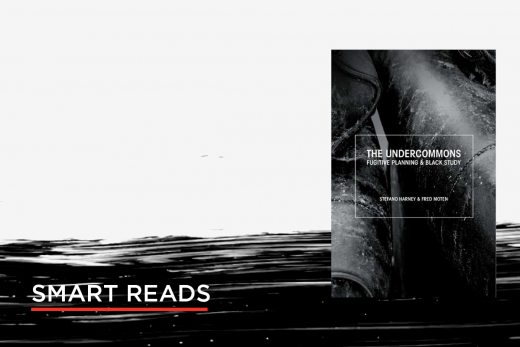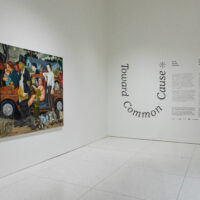Smart Reads: The Undercommons

Join the Smart Museum of Art for the June edition of Smart Reads, as we reflect on The Undercommons: Fugitive Planning & Black Study by MacArthur Fellow Fred Moten and Stefano Harney.
We invite you to read along with us and engage in two thought-provoking conversations with host Dorian H. Nash.
Register for Smart Reads
FREE. To help build a community of participants, capacity is limited and advanced registration is required. If needed, the Smart Museum can pick up the cost of the book for participants in this reading group. Instructions will be provided with your registration confirmation.
Smart Reads is presented by the Smart Museum of Art in collaboration with Seminary Co-op Bookstores.
About Smart Reads
The Smart Museum of Art’s virtual book club, Smart Reads, aims to foster care within our community during an unprecedented time of collective social anxiety and separation. Over the next year, we invite you to delve into books surrounding love, art, culture, politics, relationships, and more. Each book selection features a series of small group conversations hosted by Dorian H. Nash.
Schedule
Please register to receive the zoom links for each session.
- Part I : Thursday, June 17, 6 pm
- Part II: Thursday, June 24, 6 pm
Stay tuned for our next Smart Reads selection!
The Undercommons
by Fred Moten and Stefano Harney
The Undercommons draws on the theory and practice of the black radical tradition as it supports, inspires, and extends contemporary social and political thought and aesthetic critique. Today the general wealth of social life finds itself confronted by mutations in the mechanisms of control: the proliferation of capitalist logistics, governance by credit, and the management of pedagogy. Working from and within the social poesis of life in The Undercommons , Moten and Harney develop and expand an array of concepts: study, debt, surround, planning, and the shipped. On the fugitive path of an historical and global blackness, the essays in this volume unsettle and invite the reader to the self-organized ensembles of social life that are launched every day and every night amid the general antagonism of The Undercommons.
